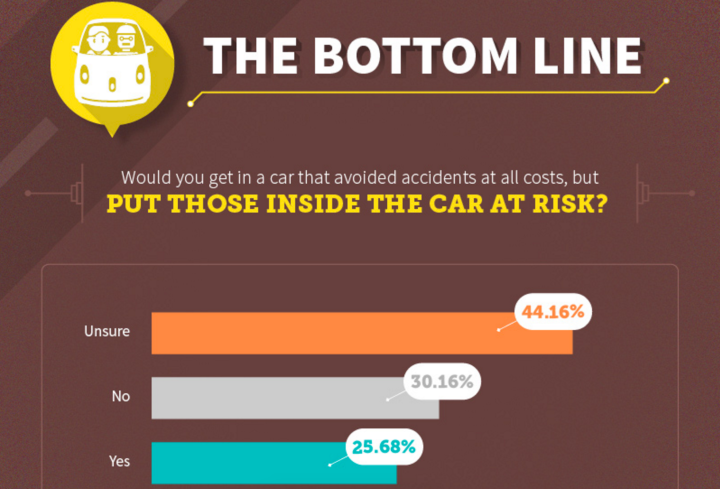
Insurance website CheapCarInsurance.net surveyed 2,000 Americans to answer precisely that question (and others), revealing some rather interesting insights into our driving habits today. Maybe it is a good thing that we’re slowly ceding our places behind the wheel after all.
About 8 in 10 respondents claimed to be excited about driverless car technology (though 5 out of those 8 still admitted to having certain reservations). That said, a greater proportion of individuals said they absolutely would buy a driverless car (41 percent) than wouldn’t (35 percent), and the remaining population remains undecided. Curiously, however, men are nearly 20 percent more open to purchase a driverless car than women.

This may just be a good thing, as men also appear to be far less empathetic drivers than women. In fact, almost 26 percent of male drivers said they’d rather strike a pedestrian than risk death themselves. When women were asked the same question, fewer than 1 in 5 agreed. When animals are involved, a similar trend appeared. Nearly 85 percent of men would hit an animal rather than risk their own lives, but only 73 percent of women agreed.
But what happens when the car is making all the decisions in these life or death situations? Who’s really to blame? According to survey results, nearly three-quarters of respondents say it’s the car manufacturer who’s at fault. 14 percent still blame those inside the car, and 13 percent fault the pedestrian (or victim, in this scenario).

Ultimately, the insurance firm notes, “people appear pretty undecided over the trustworthiness of driverless car technology.” And given that driverless cars look to be well on their way, manufacturers certainly have their work cut out for them when it comes to convincing the general public to adopt this new technology.
Infographics from CheapCarInsurance.net.
Editors' Recommendations
- Your car insurance company knows more about you than you think
- Waze now warns drivers about roads prone to car accidents
- Dubai Police to deploy driverless patrol cars with AI smarts
- How much does an electric car battery cost?
- ‘The cars are the stars.’ How automakers are electrifying the racetrack


